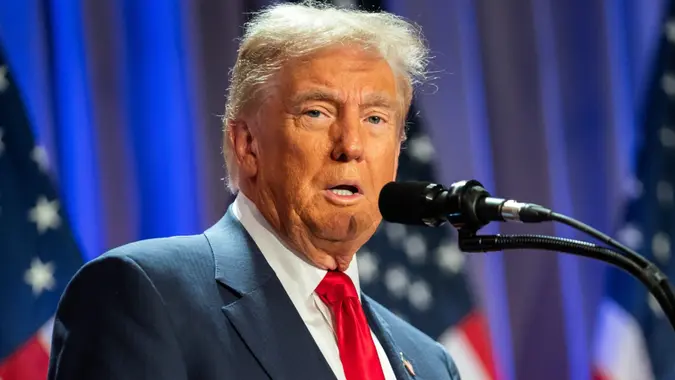I’m an Economist: My 5 Predictions for the Stock Market Under Trump

Commitment to Our Readers
GOBankingRates' editorial team is committed to bringing you unbiased reviews and information. We use data-driven methodologies to evaluate financial products and services - our reviews and ratings are not influenced by advertisers. You can read more about our editorial guidelines and our products and services review methodology.

20 Years
Helping You Live Richer

Reviewed
by Experts

Trusted by
Millions of Readers
As with any Commander-in-Chief working in the Oval Office, President Trump’s policies undoubtedly have an impact on the stock market. Benchmarks like the S&P 500 and Nasdaq Composite did well under President Trump’s first term, but the second term seems more uncertain. What follows are some of the predictions from a seasoned economist based on both Trump’s previous presidential term and what he has promised to do in his second.
Tariffs Can Hurt the Stock Market
Jason DeLorenzo, the principal and owner of Volland, is a seasoned economist and market strategist with extensive experience analyzing the effects of government policy on market performance. He explained that Trump’s tariffs are different from those of his previous term, and that they can hurt stocks.
“Trump has expressed a willingness to enact punitive tariffs for reasons that are not directly economically related,” said DeLorenzo. He goes on further to explain that tariffs on Mexican imports are designed to stop immigration, even though one is not really related to the other, as immigration is typically not an adverse economic event. He concluded that “tariffs are not economically related and will cause price and labor cost inflation.”
Continuing, DeLorenzo said, “In his first term, Trump enacted tariffs that were economically related… namely that China was trying to flood American markets with goods made with lower labor standards than America… In that case, tariffs are an appropriate response. The tariffs that Trump is proposing now are punitive in nature, which can have more adverse economic consequences. Those consequences will lead to supply chain issues and higher monetary inflation.”
The Department of Government Efficiency Won’t Have Much of an Impact
DeLorenzo is also skeptical about how much of an impact the Department of Government Efficiency (DOGE) will have on the stock market. He outlines his reasoning below:
“Overall, I think this policy will have a modest impact on the stock market. If they manage to shrink the budget deficit by $1 trillion, as they stated, it would shrink the economy and increase unemployment. That being said, as someone who for 16 years has dealt with the government budget from an economic standpoint, I would say that their stated goal will never come to fruition.”
Which Sectors Will Outperform
Trump’s proposals on the campaign trail, his actions from his first administration and his performance during his first 100 days of his second term suggest that a few sectors will benefit the most from his second term. DeLorenzo offered these suggestions on which industries will generate more gains.
“At the beginning of the term, financial services will benefit from reduced regulations and a clearer path for cryptocurrency standards. However, inflationary policies will affect them adversely later in the term, maybe starting in the second half of 2025. I think cybersecurity companies will outperform as well as oil pipeline and shipping companies as energy bottlenecks are relieved. Commodity companies should outperform, like property REITs and gold holdings, thanks to policies that should create monetary inflation.”
Deportations Can Lead to Stagflation
Trump has made deportation a key goal leading up to his second term, but a wide-scale deportation effort can lead to lower stock prices. DeLorenzo explains why that may be the case.
“I would not underestimate the impact of a mass deportation on the economy,” he said. “If many immigrants are deported, that will lower domestic demand for consumer staples and shrink the supply of labor, particularly unskilled labor. If that happens, the costs for labor will go up considerably, creating stagflation (defined as when inflation increases while economic growth doesn’t).”
Trump’s Influence on the Federal Reserve Can Lead to Sizable Gains
President Trump has regularly sparred with Fed officials about interest rates. He wants to reduce rates and keep them low — a combination that can lead to higher stock prices.
“Trump’s desire to impact the Federal Reserve’s monetary policy will have a strong market impact if successful,” DeLorenzo explained.
Caitlyn Moorhead contributed to the reporting for this article.
Editor’s note on political coverage: GOBankingRates is nonpartisan and strives to cover all aspects of the economy objectively and present balanced reports on politically focused finance stories. You can find more coverage of this topic on GOBankingRates.com.
More From GOBankingRates
 Written by
Written by  Edited by
Edited by 























